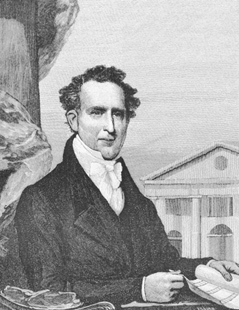- Josiah Quincy III
Infobox_Congressman
name=Josiah Quincy III

state=Massachusetts
district=1st
term=March 4 ,1805 –March 3 ,1813
preceded=William Eustis
succeeded=Artemas Ward, Jr.
date of birth=birth date|1772|2|4|mf=y
place of birth=Boston, Massachusetts
date of death=death date and age|1864|7|1|1772|2|4|mf=y
place of death=Quincy, Massachusetts
spouse=
profession=
religion=
party=Federalist
order2=2ndMayor of Boston, Massachusetts
term_start2=1823
term_end2=1828
predecessor2=John Phillips
successor2=Harrison Gray Otis|Josiah Quincy III (
February 4 ,1772 –July 1 ,1864 ) was a U.S. educator andpolitical figure . He was a member of the U.S. House of Representatives (1805–1813),Mayor of Boston (1823–1828), andPresident of Harvard University (1829–1845). The historicQuincy Market in downtown Boston is named in his honor.Biography
Quincy was born in Boston, the son of
Josiah Quincy II . He enteredPhillips Academy , Andover, when it opened in 1778, and graduated fromHarvard in 1790, studied law, and was admitted to the bar in 1793, but was never a prominent advocate. He became a leader of theFederalist party inMassachusetts , was an unsuccessful candidate for theUnited States House of Representatives in 1800, and served in theMassachusetts Senate in 1804-5.From 1805–1813 he was a member of the
United States House of Representatives where he was one of the small Federalist minority. He attempted to secure the exemption of fishing vessels from theEmbargo Act , urged the strengthening of theUnited States Navy , and vigorously opposed the admittance ofLouisiana as a state in 1811. In this last matter he stated as his deliberate opinion, that if this bill passes, the bonds of this Union are virtually dissolved; that the States that compose it are free from their moral obligations to maintain it; and that, as it will be the right of all, so it will be the duty of some to prepare definitely for a separation, amicably if they can, violently if they must. This was probably the first assertion of the right of secession on the floor of Congress.Quincy left Congress because he saw that the Federalist opposition was useless, and thereafter was a member of the Massachusetts Senate until 1820; in 1821-22 he was a member and speaker of the state House of Representatives, from which he resigned to become judge of the municipal court of Boston.
From 1823–1828 he was
mayor of Boston . In his termQuincy Market was built, the fire and police departments were reorganized, and the city's care of the poor was systematized.From 1829–1845 he was President of
Harvard University , of which he had been an overseer since 1810, when the board was reorganized. He has been called "the great organizer of the university." He gave an elective (or "voluntary ") system an elaborate trial; introduced a system of marking (on the scale of 8) on which college rank and honors, formerly rather carelessly assigned, were based; first used courts of law to punish students who destroyed or injured college property; and helped to reform the finances of the university. During his term Dane Hall (for law) was dedicated, Gore Hall was built, and the Astronomical Observatory was equipped.His last years were spent principally on his farm in
Quincy, Massachusetts , where he died onJuly 1 ,1864 . He was the father of Josiah Quincy.Works
*"History of Harvard University"
*"The History of the Boston Athenæum, with Biographical Notices of its Deceased Founders." Cambridge, MA., Metcalf and Company, 1851.References
*1911
External links
* [http://www.harvardsquarelibrary.org/HVDpresidents/quincy.php Biography, part of a series of Harvard's Unitarian Presidents]
* [http://www.nndb.com/people/423/000115078/ Josiah Quincy III] atNNDB
* [http://www.findagrave.com/cgi-bin/fg.cgi?page=gr&GRid=2836 Josiah Quincy III] atFind A Grave
Wikimedia Foundation. 2010.
